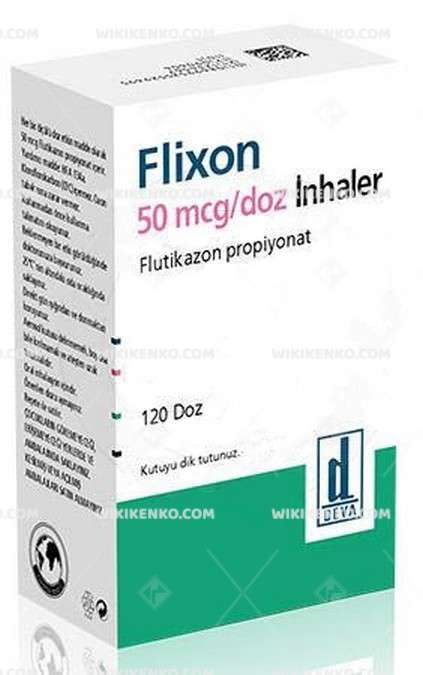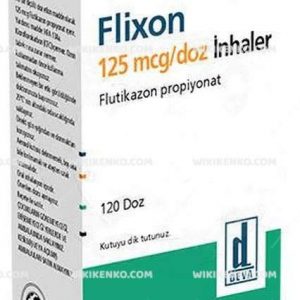Flixon Inhaler 50 Mcg
Flixon Inhaler 50 Mcg is a corticosteroid drug that contains Fluticasone propionate and is used to prevent asthma attacks in patients who require regular treatment. In this article, we will explore the uses, dosage, precautions, and side effects of Flixon Inhaler 50 Mcg.
| Dosage form | |
|---|---|
| Pack size | |
| Potency | 50 Mcg 120 Doses |
| Manufacturer | |
| Origin | |
| Generic Name (Ingredient) | Fluticasone Propionate 50 Micrograms |
Assuming your emergency circumstances for this product, visit Urgent Quotation page. Besides, for any pharmaceutical questions, please ask us in the comments section.
Description
Usage
Flixon Inhaler 50 Mcg is a preventive inhaler that is used to reduce swelling and sensitivity in the walls of the airways in the lungs, thus relieving breathing problems. It helps prevent asthma attacks in patients who require regular treatment and is used to reduce symptoms and attack frequency in patients with COPD (chronic obstructive pulmonary disease). However, it is not used to treat sudden asthma attacks.
Dosage
Each dose of Flixon Inhaler 50 Mcg contains 50 micrograms of Fluticasone propionate. The recommended dosage for adults is 1-2 inhalations twice daily. It should be used regularly every day.
Precautions for Using Flixon Inhaler 50 Mcg
Before using Flixon Inhaler 50 Mcg, it is important to consider some precautions. If you have an allergy to Fluticasone propionate or any of the excipients in FLIXON, do not use this medicine. Inform your doctor if you have increased your use of short-acting bronchodilators to relieve asthma symptoms, as this may indicate that your asthma control has worsened. Do not use FLIXON to relieve sudden asthma attacks. You will need a fast-acting and short-acting bronchodilator to relieve sudden asthma symptoms. Keep these medicines with you.
Bronchospasm may occur after a dose of FLIXON, which manifests itself as an increase in wheezing breathing. If this happens, stop using FLIXON immediately and call your doctor. In case of lack of response or severe asthma exacerbations, your doctor may increase the dose of inhaled FLIXON and treat you with systemic steroids and/or antibiotics if necessary if there is an infection.
Side Effects of Flixon Inhaler 50 Mcg
Common side effects of Flixon Inhaler 50 Mcg may include cold symptoms such as stuffy nose, sneezing, sore throat, sinus pain, low fever, cough, wheezing, chest tightness, hoarseness or deepened voice, white patches or sores inside your mouth or on your lips, headache, nausea, vomiting, and upset stomach. If you experience any serious side effects or allergic reactions after using Flixon Inhaler 50 Mcg, you should contact your doctor immediately.
Conclusion
In conclusion, Flixon Inhaler 50 Mcg is a corticosteroid drug that is used to prevent asthma attacks in patients who require regular treatment. It should be used regularly every day and is not recommended for sudden asthma attacks. However, before using this medicine, it is important to consider the precautions and possible side effects. If you experience any serious side effects or allergic reactions, seek medical help immediately.
Use the form below to report an error
Please answer the questions as thoroughly and accurately as possible. Your answers will help us better understand what kind of mistakes happen, why and where they happen, and in the end the purpose is to build a better archive to guide researchers and professionals around the world.
The information on this page is not intended to be a substitute for professional medical advice, diagnosis, or treatment. always seek the advice for your physician or another qualified health provider with any questions you may have regarding a medical condition. Always remember to
- Ask your own doctor for medical advice.
- Names, brands, and dosage may differ between countries.
- When not feeling well, or experiencing side effects always contact your own doctor.
Cyberchondria
The truth is that when we’re sick, or worried about getting sick, the internet won’t help.
According to Wikipedia, cyberchondria is a mental disorder consisting in the desire to independently make a diagnosis based on the symptoms of diseases described on Internet sites.
Why you can't look for symptoms on the Internet
If diagnoses could be made simply from a textbook or an article on a website, we would all be doctors and treat ourselves. Nothing can replace the experience and knowledge of specially trained people. As in any field, in medicine there are unscrupulous specialists, differences of opinion, inaccurate diagnoses and incorrect test results.




Reviews
There are no reviews yet.